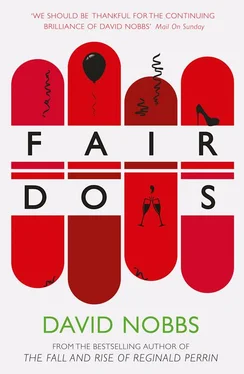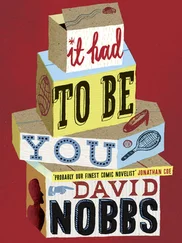‘I know,’ said the rather surprised young man. ‘They have an uncomfortable habit of hitting on the truth, don’t they?’
‘Simon! That was almost clever.’
‘I know. I have the occasional flash.’
‘How is your sex life?’
‘Non-existent.’ Simon dropped his voice. ‘I’ve given it up. That married woman I showed round one of our properties was the last woman I will ever have in my life.’
‘That’s funny,’ said Elvis. ‘I had the distinct impression she was the first woman you’d ever had in your life.’
Simon’s concern for his image wrestled with his need to confess. The need to confess won.
‘She was the first woman and the last woman I’ll ever have in my life. I hate sex. It terrifies me,’ he said. ‘There! I’ve admitted it. I’m a happy man, Elvis.’
Simon’s sister Jenny was staring at the fading day, trying to fight back tears as she thought about her own wedding day, only seventeen months ago.
The sky was dotted with clouds now. Jenny watched their shadows. At her wedding, she had been real. Now she felt that she was a shadow.
These dark shapes that floated across the neat rectangles of that over-careful garden, what could they be to a young woman so sensitive to the prospect of cosmic disaster but the shadows of strange flying creatures, birds and mammals rendered enormous and grotesque by nuclear radiation on a vast scale, huge deformed multi-breasted limbless freaks with pitted scaly skins? She shuddered and turned away from the horror of it, towards the horror of the pretended normality of the Garden Room. She walked instinctively towards Elvis, her husband’s brother, and he seemed to walk equally instinctively towards her, so that what he said became curiously important to her.
On the whole, she wished that he hadn’t said, ‘Hello, Jenny. What on earth are you wearing?’
‘Thank you,’ she said bitterly. ‘It’s made out of llama wool by very poor Peruvian Indians who need our support.’
‘Several llamas died to make it possible,’ said Elvis. ‘And you a vegetarian.’
‘Nobody’s ever suggested that having a social conscience is easy, Elvis.’
At last Elvis noticed that Jenny was close to tears. ‘I’m sorry, Jenny,’ he said, and he looked momentarily surprised at his own sincerity. ‘You look lovely.’ He kissed her, warmly, on her cold cheek. ‘Paul’s a lucky man.’
‘So are you.’
‘You what?’ Elvis was puzzled.
‘Carol’s lovely too.’
‘Oh. Yes. Right. Right. You don’t resent her for what she did with Paul, then?’
‘Not any more. That’s all over. Sorted out. Helped us to move on to a deeper and ever more satisfying plateau of shared feelings and emotions.’
‘So you’re happy?’
‘Happy!’ snorted Jenny. ‘I thought you were a philosopher. Happiness is unattainable.’
Jenny left behind her a rather lost young philosopher, who, for all his cynicism, found it easier to cope with plateaux of shared feelings and emotions than with the possibility that happiness was unattainable.
Rodney and Betty Sillitoe steamed up, two frigates in rigid formation.
‘Elvis,’ said Betty. ‘We’ve a proposition to put to you.’
‘How would you like to work for me again?’ said Rodney.
‘For us,’ corrected Betty.
‘Oh yes. Absolutely. Us. Quite. What I meant.’
‘Work for you? What as?’ said Elvis.
‘In our health food complex,’ said Betty.
‘With wholefood vegetarian restaurant,’ said Rodney.
Elvis laughed. The Sillitoes looked hurt. He wiped the laugh from his face.
‘Sorry,’ he said. ‘I was just … surprised. No, it sounds great. Sadly, though, it clashes with my career structure.’
‘Career structure?’ echoed Rodney faintly.
‘I’ve got a job,’ said Elvis. ‘With Radio Gadd. I’m …’ He couldn’t resist a self-satisfied smile, although later he would regret that he hadn’t been more modishly cool. ‘I’m moving into the media.’
Elvis hurried off, as if hot-foot on his first scoop.
Rodney and Betty exchanged looks of amazement, saw Gerry collapse wearily into a chair, and exchanged looks of social responsibility. They were lifeboats now, speeding to the scene of disaster.
‘It’s a lovely buffet, Gerry,’ said Betty.
‘Thank you,’ said Gerry politely, but from a long way away. He stood up, wearily.
‘It’s usually sit-down these days, isn’t it,’ said Betty. ‘But I like a buffet myself, on an occasion such as … this would have been.’
‘Betty!’ said Rodney. ‘It’s a very nice do altogether, Gerry. A great … er … well, not success exactly.’
‘Because of the … er … the non … er …’
‘Betty!’
‘It’s quite all right,’ said Gerry coldly. ‘I do still remember that my fiancée hasn’t turned up.’
They watched him stride away.
‘She’s well out of that,’ said Betty. ‘There’s a nasty streak there.’
‘Are you surprised?’ said Rodney. ‘He’s not exactly having a nice day.’
But Betty was no longer listening. Now that she didn’t touch alcohol, curiosity had become her tipple. And her sharp, sexual antennae had spotted Ted, far across the room, beyond the bewildered Liberal Democrats, beyond Rita’s guzzling, puzzling uncles.
‘Ooooh! Rodney! Look!’ she exclaimed. ‘Who’s that woman Ted’s talking to?’
Rodney Sillitoe, the big wheel behind a planned health food complex with wholefood vegetarian restaurant, tried not to swivel round and look.
‘Betty!’ he said. ‘Don’t be so inquisitive. It’s not the right social attitude now you’re joint managing director of –’ Yet swivel round he eventually did. ‘Oooh!’
The objects of Rodney and Betty’s interest were oblivious to these ‘oooh’s’. They were oblivious to anything except each other.
‘You’re a fascinating man, Ted,’ the striking lady in yellow was saying. ‘You have a wonderful earthy appeal.’
‘Good Lord!’ said the man who had once made the best toasting forks in Yorkshire, bar none.
‘Are you surprised that I find you interesting?’
‘Oh no, not about that. Well, yes, a bit. I mean, I wouldn’t want you to think I was big-headed or anything.’ Ted gazed into the yellow lady’s blue eyes. ‘No, I was surprised because … I mean … they say lightning never strikes twice in the same place twice.’
‘What?’ She was puzzled. ‘What lightning?’
‘Nothing. Er … Ted returned hastily to more mundane matters. ‘I … er … I don’t even know your name.’
‘Corinna Price-Rodgerson.’
Even mundane matters didn’t seem mundane. Ted Simcock was found interesting by a woman with a double-barrelled name. He caressed both barrels. ‘Corinna Price-Rodgerson! Corinna, would you …?’ The forgotten Sandra stalked past, a pile of plates wobbling dangerously. ‘Oh, you sauté your mushrooms first! How clever!’
‘I beg your pardon?’ said the astonished Corinna.
‘I … er … I didn’t want the waitress to overhear our … er …’
‘You know her?’
‘No.’ There was a crash of plates. Ted closed his eyes. It was the best attempt he could make to blot out the incident, since it is impossible to close one’s ears. ‘No! No, but … not in front of the servants, eh?’
‘My God!’ There was double-barrelled astonishment in Corinna’s voice. ‘That’s an old-fashioned attitude even for my family.’
‘Tell me about your family.’
‘They’re all in East Africa. Daddy’s a bishop. He’s also a dish.’
‘You what?’
‘A lovely man.’
‘Ah. And … er … do you have … or I mean have you had … er … ever had … a husband, as it were?’
Читать дальше












